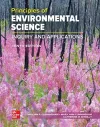
Principles of Environmental Science ISE
3 authors - Paperback
£54.99
William Cunningham is an Emeritus Professor at the University of Minnesota where he taught for 36 years in the Departments of Botany and Genetics and Cell Biology as well as the Conservation Biology Program, the Institute for Social, Economic, and Ecological Sustainability, the Center for Environmental Learning and Leadership, and the McArthur Program in Global Change. He received his Ph.D. in Botany from the University of Texas in 1963 and spent two years at Purdue University as a postdoctoral fellow. At various times, he has been a visiting scholar in Sweden, Norway, Indonesia, and China, as well as several universities and research institutions in the United States.Dr. Cunningham has devoted himself to education and teaching development at the undergraduate level in biology. He began his educational career in structural biology but for the last 10-15 years has concentrated on environmental science, teaching courses such as Social Uses of Biology; Garbage, Government, and the Globe; Environmental Ethics; and Conservation History. Within the past four years, he has received both of the two highest teaching honors that the University of Minnesota bestows -- The Distinguished Teaching Award and a $15,000 Amoco Alumni Award. He has served as a Faculty Mentor for younger faculty at the university, sharing the knowledge and teaching skills that he has gained during his distinguished career. Mary Ann Cunningham teaches geography and geographic information systems (GIS), and environmental studies at Vassar College, Poughkeepsie, NY. Her research involves using GIS to assess landscape-level problems in conservation and biodiversity. In particular, she is interested in understanding the nature of fragmentation in grassland environments and the effects of fragmentation on the make-up of bird communities. The agricultural landscapes where she has been working represent a complex and fascinating interaction of issues concerning working landscapes, resource use, remnant wildlife habitat, and landscape aesthetics. It is at the intersection of these issues that she likes to try and understand the geography of physical environments. Mary Ann earned a PhD in Geography at the University of Minnesota, an MA in Geography at the University of Oregon, and a BA in Geology at Carleton College.